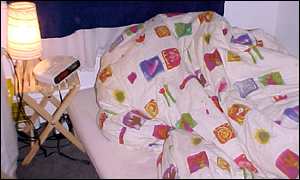
BBC News
URL: http://news.bbc.co.uk/hi/english/health/newsid_1112000/1112458.stm
Date accessed: 15 January 2001
Friday, 12 January, 2001, 00:44 GMT

And a British expert is even suggesting that people who cannot get up in the morning might be genetically flawed rather than simply lazy.
These tend to be the people who are heavily dependent on caffeine or
nicotine to keep them going
|
|
Professor Chris Idzikowski
|
While it is common for older people to doze off in the evenings and wake up at the crack of dawn, there are some younger people who share the problem.
They find it extremely difficult to alter their sleeping patterns for shift-working, and are often reliant on stimulants such as caffeine or nicotine to keep them awake until bedtime.
Wristwatch control
Otherwise, they would normally be asleep by 7pm and wide-awake by two in the morning. The Utah study examined the genetic make-up of these patients, with particular reference to genes that have an influence on the running of the brain's clock.
The researchers found one gene in particular, called hPer2, which appeared more likely to be mutated in patients with the condition. This is the first time that such a gene has been identified.
Professor Louis Ptacek, from the university, said: "A great many elderly people show these kinds of problems - and many adolescents have the opposite problem - in which insomnia prevents them from getting to sleep at a reasonable time.
"If we could shift our internal clock as easily as we could switch our wristwatches, we would adjust a lot better when we fly to Paris or London from Salt Lake City, for example."
Professor Chris Idzikowski, co-director of the Sleep Assessment and Advisory Service in Lisburn, Northern Ireland, said that the condition represented a real problem for those few who genuinely suffered from it.
Psychiatric disorders
He said: "These tend to be the people who are heavily dependent on caffeine or nicotine to keep them going.
"It has a big effect on mood, and some are wrongly diagnosed with psychiatric disorders when really it is something physical the doctors should be looking for."
He said that overtiredness in the morning could well have a genetic component. The body clock is reset subtlety every day by a combination of dawn light and evening light. One speeds up the clock, while the other slows it down, producing a balance.
Those who miss out on the correcting influence of either of these tend to fall into a spiral in which the body clock gradually becomes more and more out of synch with daylight hours.
Sleep therapists correct the syndrome by forcing the advanced phase patients to stay up late and exposing them to bright light around 0230 AM - helping to "manually" reset the clock.
However, Professor Idzikowski believes that people with these gene mutations may actually be part of a natural genetic spread in the human race which could be beneficial to society.
He said: "It is quite useful to have some people who can be fully awake at times when everyone else is fast asleep."
Category: 32. Genome Project